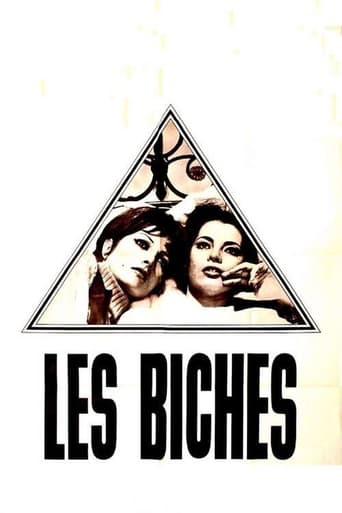Artemis-9
Stéphane Audran died last march 27, 2018. She was the fetish actress of director Claude Chabrol, and his wife since 1964. As an homage to her, I reviewed this movie again today.Stéphane Audran was awarded the Best Actress prize of 1968 in the Berlin Film Festival, for this movie. The film was cut in different markets from the original 104 minutes to 99, 97 (in USA for a PG rated VHS 1980 release), and even 88 minutes.«After seven years of rather paltry stuff, Claude Chabrol re-established his reputation with this elegantly enacted, cool, callous, and witty bisexual ménage-à-trois. It was also the first film in which Stéphane Audran (Mrs. Chabrol since 1964) was given a role worthy of her subtle expressiveness.» - Bloomsbury's Video Guide.«This movie "proves that you can make a very sexy movie with practically no nude or copulation scenes. Yet the underlying sex drive is steamy and erotic.» - The X-Rated Videotape Guide, vol. II.«1967 was the year of lesbianism in French cinema. Two films were turned with just a few months between them: "Les biches" by Claude Chabrol, with an original script, and "La Religieuse" by Jacques Rivette, upon Diderot's novel. Chabrol admits: "It was explosive for it's time. For the first time you were seeing a girl «taking» another girl... Be it the scene of the bathtub, or Stéphane's stripping, I never photographed below the navel: I always cut right in time! After all, both my does fell in love with a boy, and the most rich «won» him, what, as far as I saw it, was more immoral than a special relationship. Besides, to tell you the truth, lesbianism doesn't attract me; it only interests me as an abnormality. If a woman wants to have children, that is not the best way to achieve it..."» - Chabrol cited by Frank Deeth, "Sapho c'qui faut! Quand les biches envahissent l'écran", in "Le Crapouillot", nº 23, December 1972.The original title sends a complex message. "Les biches" (French for female doe, the sweet animal a girl is drawing on the pavement when we first meet her character) is also French slang for "girls" in the way the British used to refer to young women as "birds", and the Americans as "chicks" or "foxes", with no derogatory intention. The Portuguese title (when the lesbian word was taboo), "As Rivais" erases the essential subject of the story, emphasizing the threesome of the story. The American title, "Bad Girls" adds an ethical judgement on the two women's behaviour that is far from what we are told about their characters. Claude Chabrol was an upper-middle-class man, a bourgeois, and though he did not subscribe to the leftist agendas current in France in the 1960s, he was a permanent critic of the upper classes hypocrisy and disdain for the others. Some reviewers have pointed that the end of the movie represents the victory of the rich girl over the poor girl in their dispute for the man - therefore representing the usual, realistic triumph of the rich and powerful. Having seen many of Chabrol's films, I agree that in this one he was sending that message too, that we mostly missed for the blatant dare of showing, with taste but explicitly, love among women.
kenjha
In Paris, a rich bi-sexual woman picks up a homeless young woman and takes her to her villa, where she lives with a couple of gay men (not explained why). Despite Chabrol's reputation as the French Hitchcock, there isn't much suspense, or plot for that matter. It's basically a moody character study that is interesting enough but ultimately rather unsatisfying. Audran (then Mrs. Chabrol) is well cast as the capricious rich woman. Sassard is alluring (those lips!) as an enigmatic artist; the actress seemingly had a nice career going but retired from films after this film at age 28. Trintignant isn't given much to do as an architect that both women fall for.
MartinHafer
When this came out, the bisexual and homosexual elements of this film must have been scandalous. However, today they just seem rather tame and the writer/director didn't seem sure what sort of sexuality they wanted to explore. Yes, the two stupid and TOTALLY ANNOYING leeches that lived off the rich lady were obviously gay--this isn't really in doubt. However, the sexual relationship between the two ladies is pretty ambiguous and just when you think it's a film about lesbianism, they both suddenly show an amazing (and completely out of nowhere) interest in a guy--the same one to be exact. This seemed like a cop-out in a way--almost like saying "they thought they were gay,...but it was just a passing fad after all". So, the real impact was minimal.Now as for the story itself, I just wasn't super impressed. While it is a little better than the many Chabrol films I have seen, this isn't exactly a glowing endorsement, as often his films seem pretty transparent--i.e., you can certainly guess how the film is going to end and the "twists" don't especially pay out. Overall, a very overrated time-passer and that is all.
vogler235
Many films uses the "Menage a Trois" element to cause disturbances in the relationship between three people. "Les Biches" uses this device to completely destroy its three characters. A perfect psychological film, "Les Biches" is the ONLY film that I know where it doesn't use Menage a Trois as a facade, but allows the film to explore its themes of Jealousy and Obsession to a sensual and extremely disturbing effect. Not even Truffaut's "Jules and Jim" used the device to this extent. This film is suited for people who loves to watch movies that will make us think, rather than movies that tells us what to think. Truly a hypnotic character study on physical and spiritual obsession. Kudos to Chabrol, his lovely wife Stephane Aubran, cinematographer Jean Rabier, and the sensuous Jacqueline Sassard for their specific roles in creating a chilling masterpiece.


